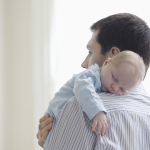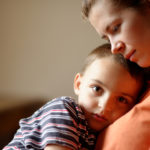According to recent studies, the participation of fathers in childcare nearly doubled between 1965 and 2011. Despite this growing involvement of fathers in their children’s lives, pediatric visits continue to be focused on the mother-child relationship. Few early parent education programs focus on fathers.
Paternal involvement positively affects infant neurodevelopment, but also decreases maternal stress and reduces maternal burden, which further contributes to healthy infant neurodevelopment and may lower risk for postpartum depression in the mother. However, we must acknowledge that fathers may also suffer from postpartum depression and that paternal depression may have a negative effect on the child’s development and behavior.
The American Academy of Pediatrics (AAP) updated its guidance for pediatricians on the role of fathers in the care and development of their children in 2016. A recent article article in Contemporary Pediatrics (see below) reviews some of the data on how fathers contribute to the development and wellbeing of their children and outlines how we can be more inclusive and supportive of fathers in this setting.
Ruta Nonacs, MD PhD
Fathers’ influence on development and well-being of children (Contemporary Pediatrics)








Leave A Comment